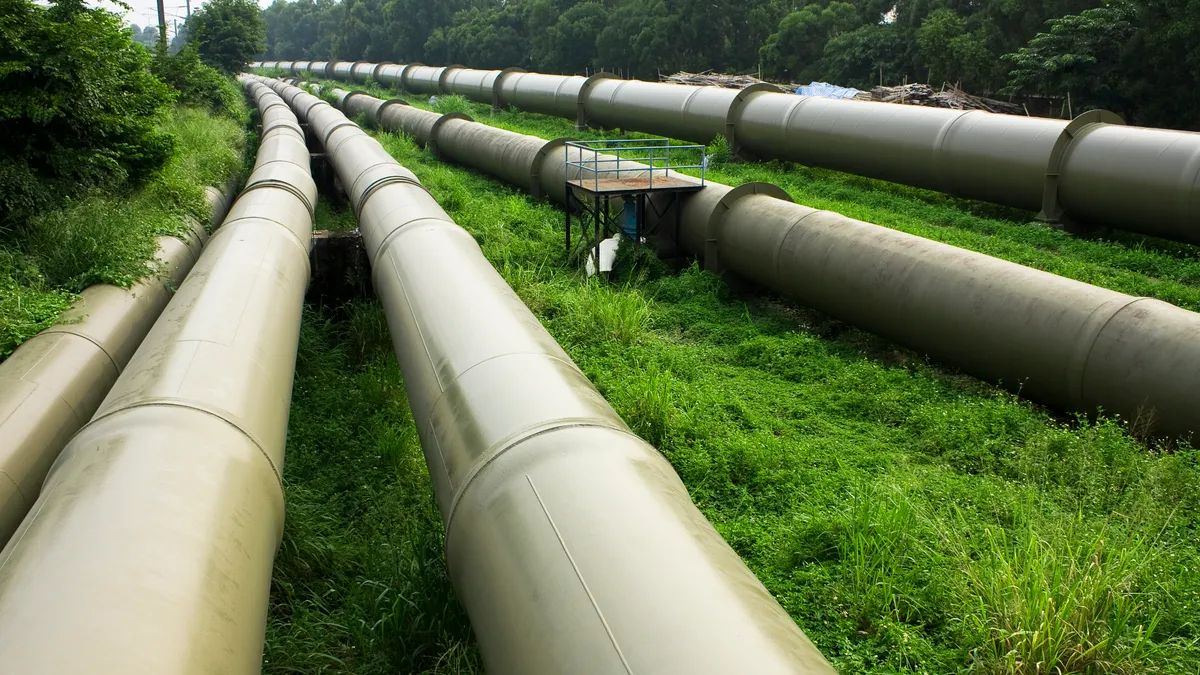Dive Brief:
- Lawmakers from three states pushed the Federal Energy Regulatory Commission this week to approve Dominion's proposed Atlantic Coast Pipeline as environmental groups vowed a last minute appeal, saying the $5.1 billion system is not necessary.
- The Daily Progress notes 16 lawmakers from Virginia, West Virginia and North Carolina asked FERC to approve the project, touting the economic impacts and the need for additional gas supply.
- The Southern Environmental Law Center, however, argues Dominion's forecasts for gas and power demand are too high and the pipeline is not necessary under more realistic expectations. Other groups argue FERC's environmental review was "completely inadequate and falls far short of legal requirements."
Dive Insight:
Comments have been filed in the Federal Energy Regulatory Commission's consideration of a 600-mile gas pipeline proposed for the East Coast, revealing a gulf between state lawmakers and environmental advocates.
Dominion's proposed Atlantic Coast Pipeline is planned to run roughly 600 miles, moving gas supplies from West Virginia to North Carolina through a $5.1 billion system with a capacity of 1.5 million dekatherms/day.
FERC staff last year recommended the pipeline move forward, but green groups say the commission is overestimating the need for new new gas capacity.
An attorney from the Southern Environmental Law Center told local outlet C-ville this week that Dominion's expectations for power demand are far higher than recent estimates from regional grid operator PJM, making the project seem more necessary than it may be.
PJM's forecasts for peak power demand in 2027, for instance, are more than 3.5 GW lower than the estimates used by Dominion to justify the pipeline, SELC claims. Dominion officials say the PJM models do not take into account "several factors that drive up demand that are unique to Virginia."
Other green groups criticized FERC's environmental review process.
According to the Alleghany-Blue Ridge Alliance, which represents more than 50 organizations opposed to the project, FERC's assessment failed to assess the true market demand for natural gas in the region and inadequately considered the impacts construction and operation would have on predominantly minority and low-income neighborhoods.
“FERC’s inability to provide a sound analysis of this project is a violation of the National Environmental Policy Act,” Alliance Executive Director Lewis Freeman said in a statement. "What’s more, the Commission is poised to make a decision that will reverberate for decades based on inadequate information.”
Those views stand in contrast to a bipartisan group of lawmakers from Virginia, West Virginia and North Carolina, who have petitioned the commission with another view.
The pipeline is "no threat to our states’ priceless natural resources” and they say it will help “protect our region’s environment by making clean-burning natural gas more available.”
FERC staff, in its December 2016 recommendation the project go ahead, issued a lengthy report concluding the project "would result in temporary and permanent impacts on the environment, and would also result in some adverse effects." However, staff concluded that with mitigation measures "the majority of project effects, with the exception of impacts on forest vegetation, would be reduced to less-than-significant levels."
FERC is expected to release a final environmental impact statement on the pipeline in June and issue a final decision by autumn.














